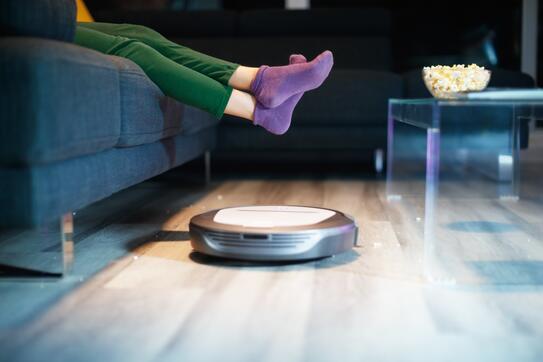Top Takeaways
- Autonomous products are becoming increasingly sophisticated—able to cook meals and vacuum floors—but consumers who derive meaning from manual labor resist robots taking over tasks they value.
- Consumers who scored high on a novel meaning of manual labor (MML) measure were skeptical towards autonomous products, which fully take over a task, but not of automated products, which only partly take over a task.
- Companies can identify which consumers value manual labor by observing their behaviors and preferences, and can market autonomous products to these consumers by highlighting other uses of saved time, such as being with friends and family.
Research
Compared to panic that generative AI will replace many jobs, autonomous products that can cook, clean, or mow the lawn seem uncontroversial. However, Meyer Feldberg Professor of Business Gita Johar’s latest research suggests that consumers who find manual labor meaningful may resist autonomous products. A simple change in marketing, however, can shift their attitudes.
Many consumers hesitate to embrace new products, a tendency Johar has long analyzed in her research. Consumers might be generally skeptical of technology. They might fear losing control, as with self-driving cars. Or maybe traditional processes are woven into their identity, such as an old-school baker used to kneading dough by hand. In this paper, Johar and her colleagues constructed and tested a new variable: meaning of manual labor (MML).
Finding meaning in life, the researchers emphasized, is a higher-order need humans share, even as what we find meaningful can differ. People who treat manual labor as purely functional and score low on the paper’s MML variable might eagerly adopt autonomous products. However, people who feel manual labor provides meaning and score high on MML likely see autonomous products as taking over an important part of their lives.
Since consumers differ in how much they value manual labor, the researchers explored how manual labor attitudes influence autonomous product preferences. And since consumers who value manual labor also find meaning in other parts of their lives such as family or work, the researchers evaluated whether highlighting uses of time saved through autonomous products could counteract some consumers’ resistance to robots.
Johar and her co-authors deployed four field and experimental studies:
- Study 1 showed that consumers who value manual labor had worse views of autonomous products. Comparing a general population survey with autonomous product owners revealed that owners derived less meaning from manual labor.
- Study 2 sought to rule out other reasons consumers might resist autonomous products, such as general aversion
- to new technology. Consumers who value manual labor were only skeptical of autonomous products that would fully replace their work. They were not skeptical of new automated products that would make their work easier.
- Study 3 disentangled meaning of manual labor from identity relevance. When identity drives consumption, a person might resist automation. An old-school baker who views hand-kneading as a signal of artisan credibility might reject a stand-mixer that streamlines work. But Study 3 reaffirmed that valuing manual labor only leads consumers to resist autonomous products, not automated ones. This effect persists for both identity relevant activities like cooking and less identity relevant tasks like mowing the lawn.
- Study 4 disentangled meaning of manual labor from identity relevance. When identity drives consumption, a person might resist automation. An old-school baker who views hand-kneading as a signal of artisan credibility might reject a stand-mixer that streamlines work. But Study 3 reaffirmed that valuing manual labor only leads consumers to resist autonomous products, not automated ones. This effect persists for both identity relevant activities like cooking and less identity relevant tasks like mowing the lawn.
Conclusion
Overall, the four studies showed that the new age of autonomous products can challenge but also bolster humans’ longstanding search for meaning. The studies indicated that valuing manual labor leads to skepticism of autonomous products but not automated ones, and validated a simple intervention to counteract this skepticism.


